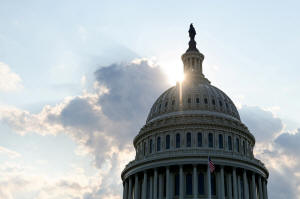As debt limit looms, U.S. Senate Democrats see showdown vote next week
 Send a link to a friend
Send a link to a friend
 [September 23, 2021]
By Richard Cowan and Susan Cornwell [September 23, 2021]
By Richard Cowan and Susan Cornwell
WASHINGTON (Reuters) -The U.S. Senate aims
to vote next week on raising Washington's borrowing authority and
keeping the government funded, the chamber's No. 2 Democrat said on
Wednesday, as a House Democrat warned that Republican opposition could
lead to a historic default on the nation's debt.
Senator Dick Durbin said the chamber sometime next week would take up
the bill passed in a party-line House of Representatives vote. Senate
Republican leader Mitch McConnell has said his caucus will sink the
emergency legislation to suspend the $28.4 trillion federal debt
ceiling.
Republicans have said Democrats should act alone to raise the debt
ceiling, using a maneuver called "budget reconciliation."
Time is short as funding for federal agencies expires on Oct. 1 and the
U.S. Treasury has warned it could run out of money to pay the
government's bills by some time in October, potentially triggering a
default.
House Budget Committee Chairman John Yarmuth said "parliamentary
obstacles" prevent Democrats from including language to raise the debt
ceiling in a social spending bill moving through Congress under the
budget reconciliation maneuver that circumvents the need for Republican
votes.

"The ball is now in Senator McConnell's court. If he doesn't support
this (House-passed) bill - or at least ensure it is not filibustered -
our country will default and our government will shut down," Yarmuth
said in a statement. "The decision is now his."
It further complicates a messy picture for Congress, where talks aimed
at police reform collapsed on Wednesday and the moderate and progressive
wings of President Joe Biden's Democratic Party are deeply divided on
the size of a proposed $3.5 trillion social spending bill that is at the
core of the White House's domestic legislative agenda.
Republicans are betting that dragging out the debate over the debt will
further stymie Democrats.
Republicans say they support additional spending to keep the government
operating with the Oct. 1 start of the fiscal year and to help
communities recover from recent natural disasters.
But they refuse to vote for it, saying raising the nation's borrowing
authority is Democrats' problem because of the $3.5 trillion spending
plan to invest in expanded social services and address climate change.
Democrats note that they voted to raise the nation's debt limit during
Republican Donald Trump's administration even though they opposed deep
tax cuts that added to the debt.
'ACCEPT RESPONSIBILITY'
Durbin said: "There comes a point where you have to accept
responsibility" for avoiding a U.S. government default on its debt in
coming weeks and provide temporary federal funding for the fiscal year
that begins on Oct. 1 to avoid the third partial U.S. government
shutdown in a decade.
[to top of second column]
|

The dome of the U.S. Capitol Building is seen as the sun sets on
Capitol Hill in Washington, U.S., July 26, 2019. REUTERS/Erin
Scott/File Photo

Federal Reserve Chair Jerome Powell said on Wednesday
it is "very important" for Congress to raise the federal debt
ceiling in a timely fashion and that no one should assume the
central bank can fully protect the economy or financial markets in
the event of a U.S. debt default.
Biden met on Wednesday with a number of Democratic lawmakers in an
attempt to heal divisions over his budget reconciliation plan of
climate and social spending measures that Democrats aim to pass in
coming weeks using special procedures that do not require Republican
support.
Moderate Democrats see the price tag as too high, while some House
progressives are threatening to vote down a bipartisan $1 trillion
infrastructure bill backed by the president, and set for a Monday
vote, unless the $3.5 trillion bill is also nailed down.
The White House said in a statement after the meetings that
"progress was made toward finding the pathway forward" on both
bills. It said Biden and his team would have follow-up meetings
starting on Thursday.
Among attendees, moderate Democratic Senator Joe Manchin, who has
urged the price tag of the spending plan be no more than $1.5
trillion, said: "He (Biden) just basically said: 'Find a number
you're comfortable with, based on the needs that we still have, and
how we deliver to the American people.'"
But there were fresh signs of Democratic infighting as 11 liberal
senators supported the House progressives who want the planned
Monday vote on the bipartisan infrastructure bill delayed.
Senator Bernie Sanders and the other 10 senators said in a statement
they had voted for the bill with the understanding it and the
spending plan would move together.
"Passing the infrastructure bill first would be in violation of that
agreement," they said. "That is what we agreed to, itís what the
American people want, and itís the only path forward for this
Congress.Ē

(Reporting by Richard Cowan, Susan Cornwell, David Lawder and David
Morgan; Editing by Scott Malone and Peter Cooney)
[© 2021 Thomson Reuters. All rights
reserved.] Copyright 2021 Reuters. All rights reserved. This material may not be published,
broadcast, rewritten or redistributed.
Thompson Reuters is solely responsible for this content. |